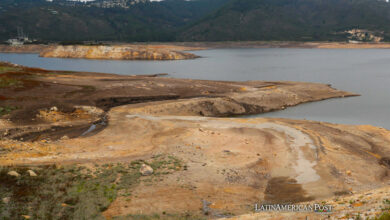Mayan Train: Overshadowed by Environmental Damage and Impact on Communities
The Mayan Train is an ambitious work that has generated debate in Mexico and Latin America. This project has been criticized for its environmental impact and impact on local indigenous communities.

Photo: TW-TrenMayaMX
LatinAmerican Post | Jorge Vuelvas Lomeli
Listen to this article
Leer en español: Tren Maya: opacado por el daño ambiental y afectación a las comunidades
With the objective of connecting six states of the Mexican southeast, promoting tourism and economic development, the Mayan Train was created. Despite its promises of success, this work has been overshadowed by concerns about environmental degradation and the violation of the rights of indigenous and rural communities. We will analyze why this mega work is so controversial. We will also explore the prospects and challenges you will face in the future.
We recommend you read: Escazú Agreement and other environmental challenges in Latin America in 2023
Environmental Impact of the Mayan Train
Despite the fact that the government has declared that the construction will not cause damage to the environment because it will be carried out on old roads, civil, national and international organizations question this statement.
The Mexican Center for Environmental Law (CEDMA) has stated that the uncertainty about the final outline of the project prevents the precise identification of the impacts that may affect terrestrial and coastal ecosystems. The Articulación Yucatán collective has denounced that, despite the numerous public complaints about the Mayan Train, the responsible authorities have not responded and have minimized or discredited those who denounced it.
A decree on priority works, approved in 2021, has had a direct effect on the works of the Mayan Train, specifically on sections 5, 6 and 7, which go from Quintana Roo to Campeche. This legal instrument has allowed the National Fund for the Promotion of Tourism (legal manager of the Mayan Train) and the army (who is building and will manage part of the project) not need to wait for permission from any regulatory body, including the Environmental Impact Statement ( MIA) issued by the Secretary of Environment and Natural Resources of Mexico (Semarnat).
Among the environmental impacts that the Mayan Train could cause include deforestation, noise pollution and the affectation of water reserves. The construction of the Mayan Train could result in the felling of 2.500 hectares of humid and dry forests, representing approximately 8 million 736 thousand trees. Mexico occupies one of the first places in deforestation worldwide, noise pollution can have an impact on ecosystems and the fauna that inhabits them, affecting the ability of animals to listen to their predators and causing interference in their mating. The Yucatan Peninsula region is an important water reserve, especially of underground origin, which increases concern.
Despite the above, the army continues with the project and President Andrés Manuel López Obrador has dedicated himself to insulting in his "morning" conference the organizations and activists who have denounced ecocide in the south of the country. But there is not only environmental damage, the United Nations, together with other non-governmental organizations, have denounced that the human rights of the indigenous communities of the region are at risk.
Impact on Local Communities
Since the year 2020, United Nations Special Rapporteurs They expressed their concern about the Mayan Train project, due to its impact on indigenous communities and its possible violation of human rights. In a letter sent to the Government of Mexico, the independent experts denounced potential violations of a wide range of human rights, including the right to participation and consultation with affected communities, environmental degradation, and the rights of individuals and advocacy organizations that are fighting against the negative impacts of this mega-project.
In addition, the organizations that spoke out in November of that same year called attention to the failure of the Mexican State to comply with its international human rights commitments, including the International Covenant on Civil and Political Rights, the International Covenant on Economic, Social and Cultural and Convention 169 of the International Labor Organization. Therefore, they have urged the Government to protect the rights and freedoms of the people affected by the Mayan Train.
To date, the impact on territorial rights, the right not to be evicted, and the right to health of indigenous communities, as well as the risks of environmental, biodiversity, and water damage resulting from the project, continue to be worrisome. In addition, the project is being managed by the military, which increases the risk of further violations of the guarantees of those activists who have defended indigenous communities.
For its part, the National Human Rights Commission of Mexico (CNDH) has open four issues related to the Mayan Train. However, since the head of said body (Rosario Piedra Ibarra) was elected, a bias has been observed in her resolutions that could affect the Federal Government, since she was elected by a Senate close to President AMLO and at the time was accused to the president of the CNDH of her close relations with power.
Project Challenges
Different organizations have promoted injunctions to stop this project. These legal instruments are already in the Supreme Court of Justice of the Nation (SCJN), which will have to decide if the continuity of the Mayan Train is viable. But if it is ruled in favor of the government, and the army continues with one of the biggest ecocides in Mexico, these could be the implications:
- One of the most important forests in Latin America would be deforested, sowing a terrible precedent in the collective environmental conscience.
- Fauna would constantly suffer from noise pollution.
- The water reserves in the Yucatan Peninsula would be affected.
- Impunity would continue for the violation of the human rights of indigenous and Afro-Mexican people.
- The rule of law in Mexico would be called into question, since it would be assumed that there is no SCJN and a CNDH capable of counterbalancing the Executive Power.
- Environmental commitments that have been signed by the Mexican State over the last decade would be breached.
This year will be key for the Mayan Train, since AMLO's campaign commitment was to deliver this project in the last quarter of 2023. The judicial dispute between the organizations that defend the Mayan jungle and the presidential power could intensify in the coming months, due to so it will be important that international organizations continue their advocacy work against this ecocide.




